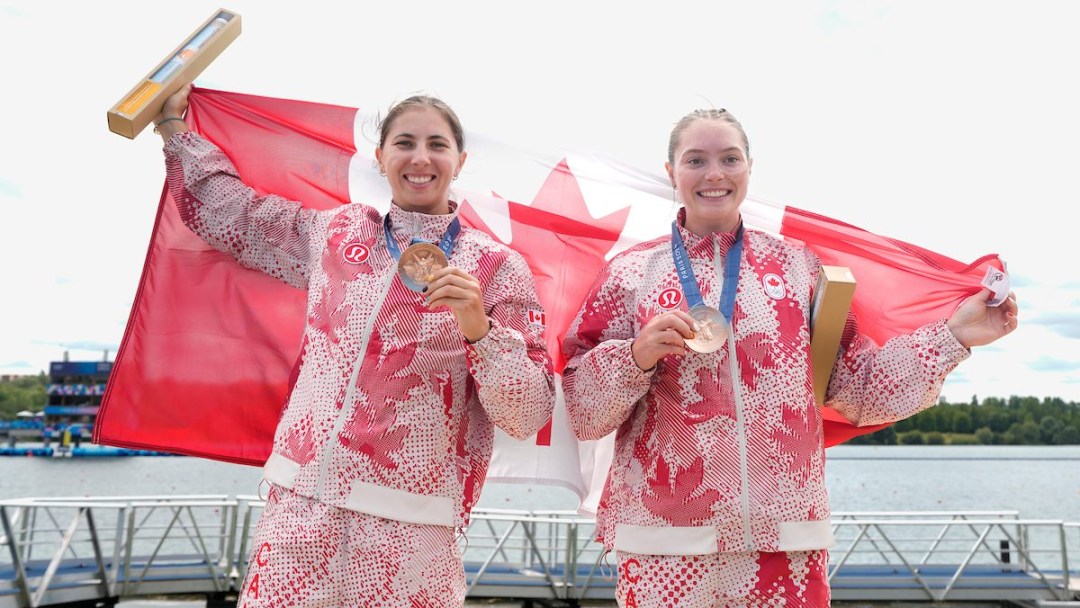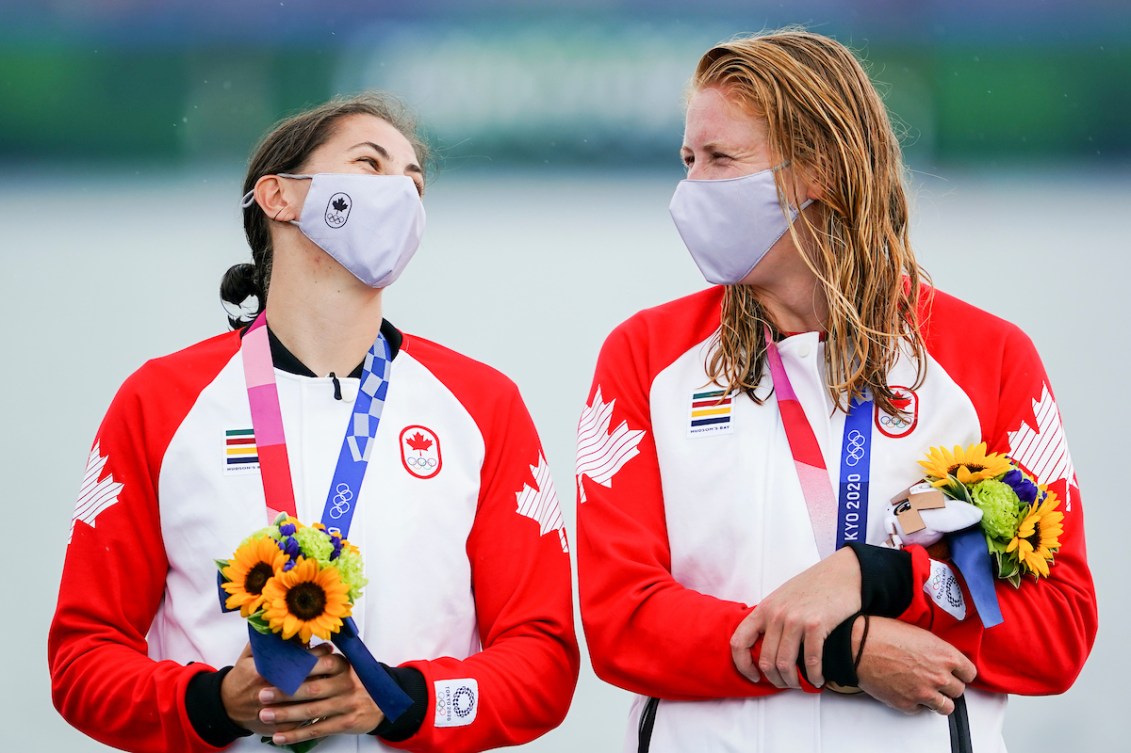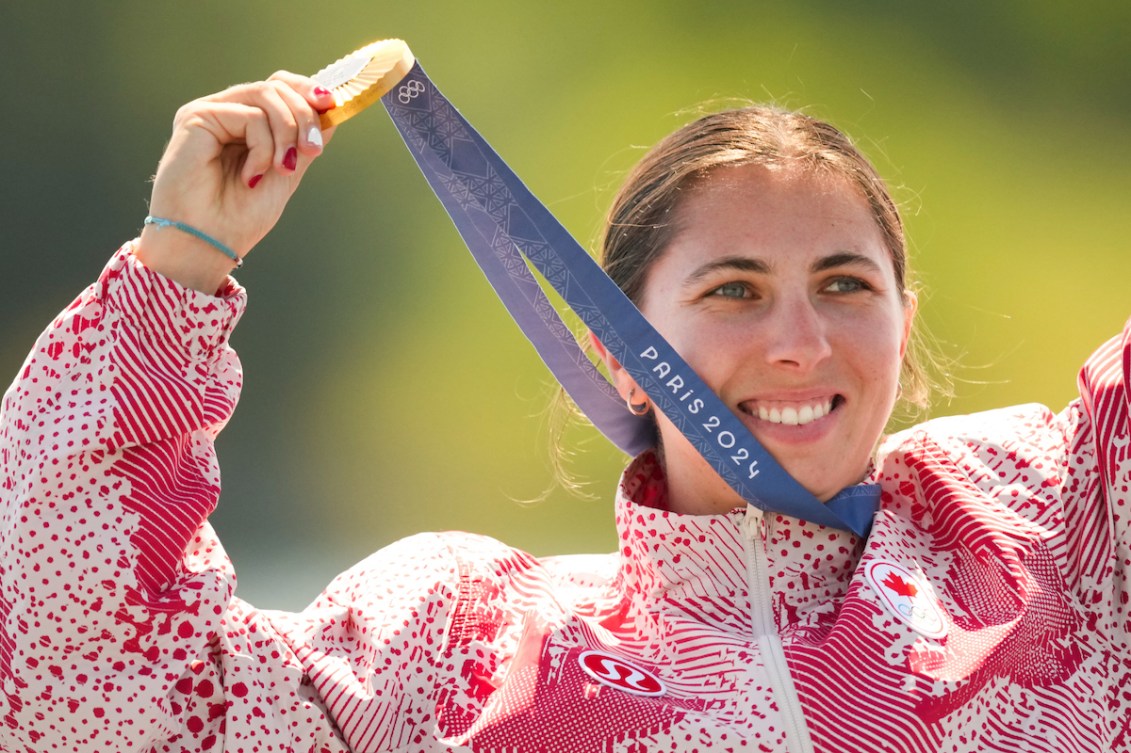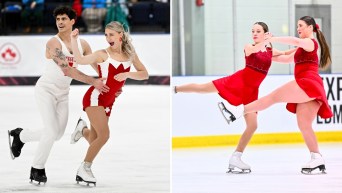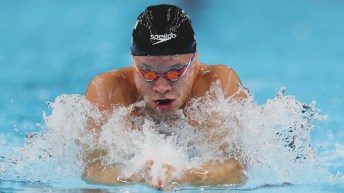Deja vu meets brand new: Team Canada paddlers share what went on behind the scenes at Paris 2024
Katie Vincent is having deja vu.
At her first Olympic Games, Tokyo 2020, Vincent stood on the podium proudly, having won a bronze medal in the women’s C-2 500m alongside teammate Laurence Vincent Lapointe. The Chinese team of Xu Shixiao and Sun Mengya took gold, and the Ukrainian duo of Liudmyla Luzan and Anastasiia Rybachok took silver. What a day.
Three years later, Vincent is on the podium at Paris 2024. She is standing on the third step, having won a bronze medal in the women’s C-2 500m. If she looks over her right shoulder, she can see the Chinese team of Shixiao and Mengya on the top step, alongside Ukrainians Luzan and Rybachok on the second step. What a day.
Five repeat medallists, all on the same podium steps, three years later.
“The only difference was Sloan [Mackenzie, Vincent’s current teammate],” Vincent says with a laugh. “It’s kind of crazy to think about how different the racing and experience was compared to racing with Laurence…but achieving the same thing. So it’s kind of weird in my brain.”
Olympic.ca chatted with Vincent and Mackenzie after they had a bit of time to savour their Paris 2024 experience. The two paddlers shared some of what goes on behind the scenes at an Olympic Games, as well as some culinary highlights that will be sure to give you a chuckle.
How it started
Mackenzie first met Vincent when she was invited to a junior national team training camp where they were briefly paired in a C-2 together as an exercise–an older athlete and a younger athlete put together for fun. They tried out the C-2 once again at Mackenzie’s first national team training camp in 2020. Again, it was a one-off, as Vincent was still partnered with Vincent Lapointe ahead of Tokyo.
Following Vincent Lapointe’s retirement, the 2021 national team camp involved testing out different pairings. With the third time being the charm, Mackenzie and Vincent officially became a partnership.
“I was shocked,” said Mackenzie. “I was young then [19] and I couldn’t believe it.
“I just remember the coach saying, ‘You’re with Katie–she’s the fastest on the team. You have to train super hard to make sure you stay in the C-2.’ And I was like ‘I will! I will!’”
At first the duo and their coaches tried things out with Mackenzie in the back of the boat and Vincent in the front–the opposite of Vincent’s setup with Vincent Lapointe. After racing in those positions in 2022, including a sixth-place finish at the world championships, the team switched places, with Vincent in the back and Mackenzie in the front.
“I think it just clicked like that. From there, we just got a little better and better every time we raced,” said Mackenzie.
They finished third at the 2023 ICF World Championships, qualifying Canada a spot in the C-2 500m for Paris 2024. At the Santiago 2023 Pan Am Games, they stood atop the podium.
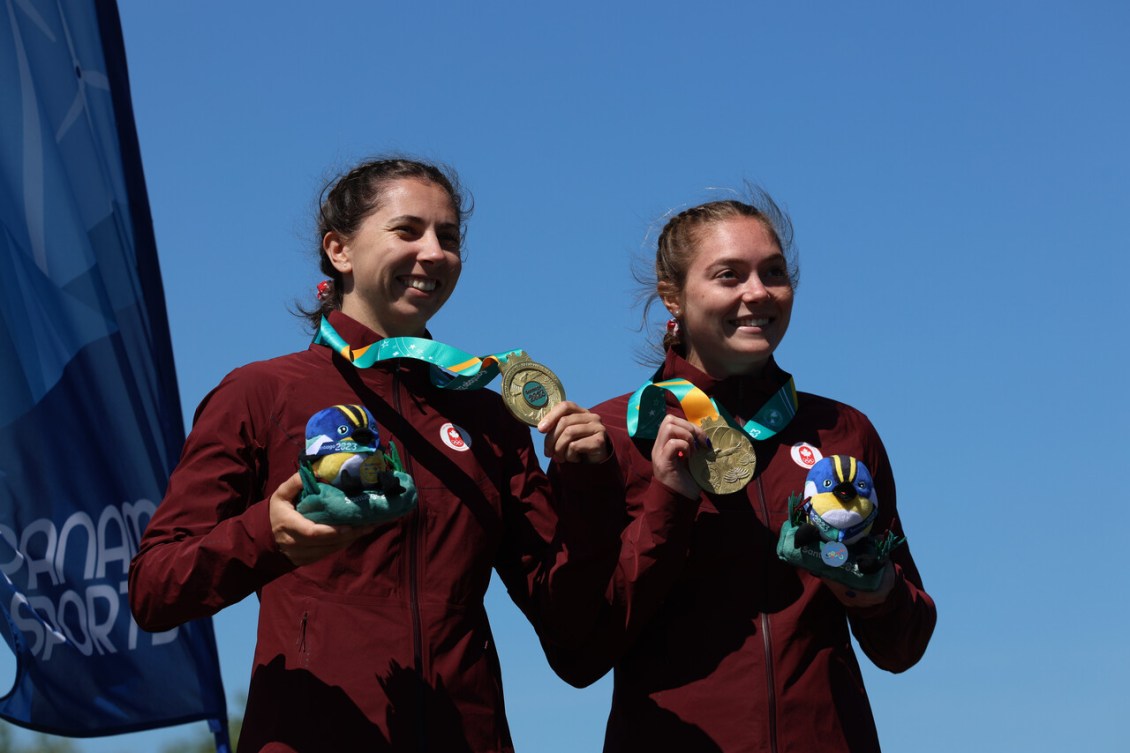
Paris 2024
Paris 2024 would be Mackenzie’s first Olympic Games, but luckily for her, Vincent was there to help ease anxiety and set expectations.
“You build it up in your head for your whole life, your whole career,” Vincent said. “I think [that] me having that experience and knowing the nerves and knowing to stay focused and stick to the plan helped us keep cool as a team. We tried to be cool as a cucumber.”
They kept things lowkey at their satellite village east of Paris proper. When asked about her Olympic experience, one of the first things that jumps to Vincent’s mind is the daily trips with a teammate to buy a pastry from a local bakery–a small daily ritual to treat themselves to a bit of the Paris experience each day, even outside of the city. They’d watch the Games on TV to stay in touch with Team Canada without getting overstimulated or stressed out.
Sprint canoe involves racing twice in one day–often with only 90 minutes in between. Heats and quarterfinals happen on the same day, followed by semifinals and finals on another. Paddlers have to give enough to make it to the next round, but not so much that to take away from their next performance. The duo practiced time trials 90 minutes apart for a year leading into the Games, to simulate the Olympic experience.
Vincent likes to keep things light before races, chatting with those around her. Mackenzie’s pre-race routine also fits the bill of keeping things light, but with a bit more specificity to it.
“I will hum Taylor Swift in my head before we start to not think about the race and get too nervous,” she says.
The song of choice for Paris 2024? “Fresh Out The Slammer.” Perhaps not the first thing that pops into your head when you think of a pump-up song, but hey, whatever works–the Canadian duo got things rolling at Paris 2024 by setting an Olympic Best time of 1:54.16 in their first round heat.
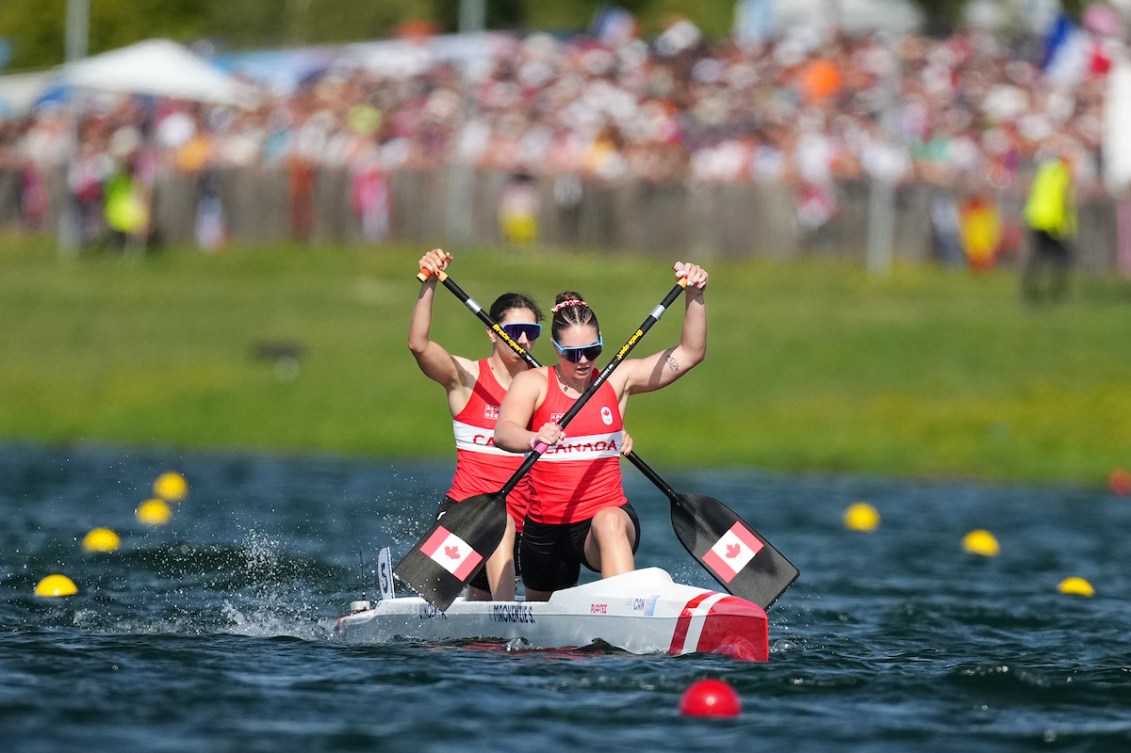
Once they advanced through the semifinals, the pair had an hour and a half to gather themselves for the final. We asked Mackenzie, who is a dietetics student, what the snack was between races, figuring she would have a very strategic answer.
“I think one Ritz cracker, one piece of chocolate, and one of the little gummy energy chews,” she said with a laugh. “It was all I could get down because I was so nervous!”
Fuelled by all the most important food groups, Mackenzie and Vincent lined up in front of 20,000 fans for the final–something that rarely happens for paddlers and was a distinct difference from Vincent’s last Olympic experience at Tokyo 2020.
Off the start, China jumped out to the lead, but MacKenzie and Vincent were not far behind. At the midway mark, the Canadian boat was in second, just ahead of Poland. But in the last 100 metres, it was the Ukrainian duo who really picked up their pace, moving from sixth place at 250 metres to get the nose of their boat across the finish line just ahead MacKenzie and Vincent.
In a photo finish, the Canadians took bronze in 1:54.36, missing out on the silver medal by just 0.06 of a second.
Not done yet
But it wasn’t pure celebration time for Vincent quite yet, as she still had to double back to race the C-1 200m the next day. Competing in more than one event requires additional foresight to the little things–including making sure that you’re recovering with more fuel than a single Ritz cracker.
And according to Vincent, everything tastes better immediately after winning an Olympic medal.
“Our support staff made me a sandwich and put it in my podium kit. So I’m literally putting my podium outfit on while eating this baguette with meat and cheese. I’m sitting there going, ‘oh yeah, this is the best-tasting sandwich I’ve ever had!’”
Buoyed by a great sandwich and a standing ovation on the Olympic podium, Vincent’s positive mood rolled over to the next morning, when she would race again.
“I woke up and I just knew I could have a great day out there,” Vincent said.
Sunny. No wind. Great vibes from standing on the podium the day before. There’s not really much more that a paddler could ask for. But then Vincent beat the defending Olympic champion in the semifinal, which made for another additional confidence boost.
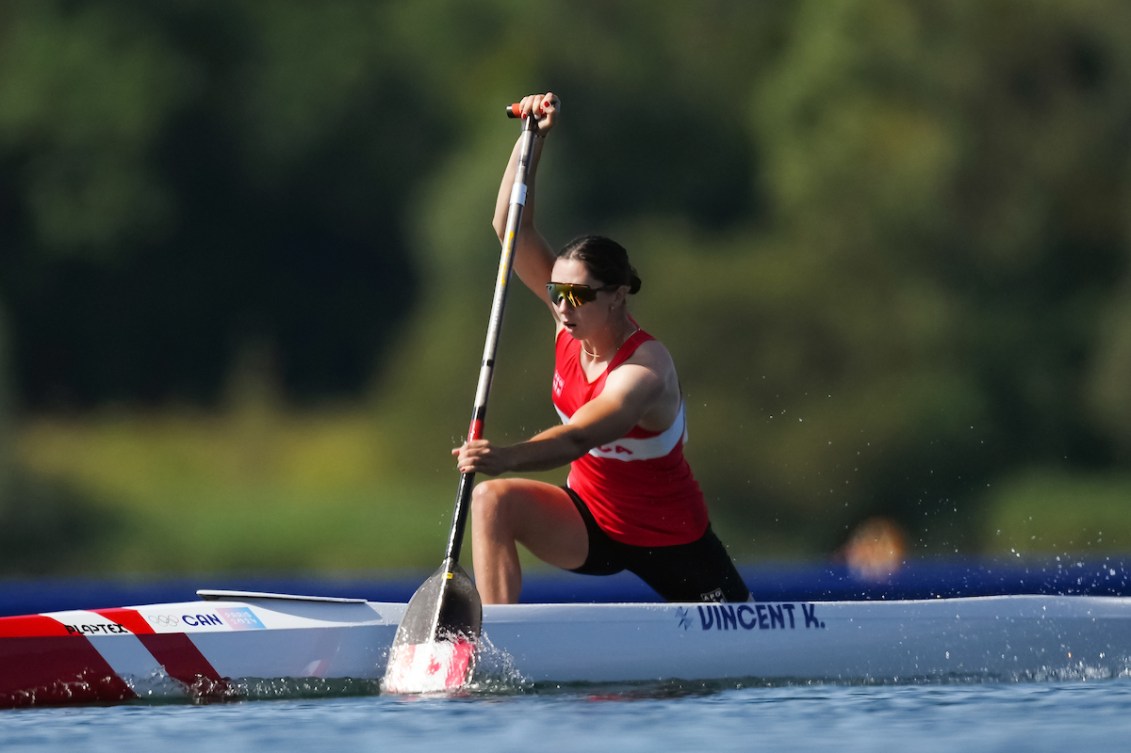
Canada was sharing a boat bay with New Zealand during the Games, meaning that before her own race, Vincent had a front row seat to Kiwi kayaking legend Lisa Carrington’s pre-race preparation.
“You’re just watching the greatest of all time be chill and funny, so that sort of kept my mind thinking, ‘hey, that’s how she’s acting…and everyone knows she’s going to win!’”
But then there’s that moment when 20,000 spectators get completely silent as your race is about to start, and things don’t feel quite so chill and funny anymore.
“That’s when you’re like: ‘yeah, this is the most terrifying moment of my life…’”
Vincent knows she’s more of a finisher than a starter, claiming that she’s never in first place within the first 50m of a 200m race. She also paddles on the left, meaning that during the final, she had no perception of where her closest competitor–Team USA’s defending Olympic champion Nevin Harrison–was throughout the race. She could only get some sense of her placement in relation to Cuban athlete Yarisleidis Cirilo.
“I had no clue what was happening. But I knew if I was ahead of the Cuban, she was one of the best. She was the world champion last year. So I knew I should be in a good position, unless the sky is falling.”
Vincent and Harrison crossed the finish line imperceptibly close to one another–a photo finish. Vincent provided the behind-the-scenes context.
“So what happens is there’s actually a screen that faces the water where we are, so nobody else sees that. And Canada popped up….and then it went away! So I was like ‘Oh no, don’t do that. That can’t be good.’”
But then Canada popped up again. Gold by one-one hundredth of a second.
“It felt like a lifetime. I aged three years,” she added with a laugh.
Vincent roared with delight, gesturing for the crowd to cheer. What she didn’t realize was that there was a delay between the screen she was seeing and the ones facing the crowd. Seconds later, the Canadian cheer section exploded. The accomplishment marked Canada’s first ever Olympic gold medal in any women’s canoe or kayak event.
So, once again, Vincent pulled on her podium kit (no mention of a sandwich this time). While grabbing her change of clothes, it occurs to her that since she has her phone now, she could look up how fast the race was–a fact she is still currently unaware of.
“I’m like wait, wait, wait–I need to see how fast that was.”
And so, instead of having the best sandwich of her life, Katie Vincent got to find out that she had set a world record.
And this time, when she stands at the top of the podium there’s no deja vu at all–no, this feeling is brand, brand new.

